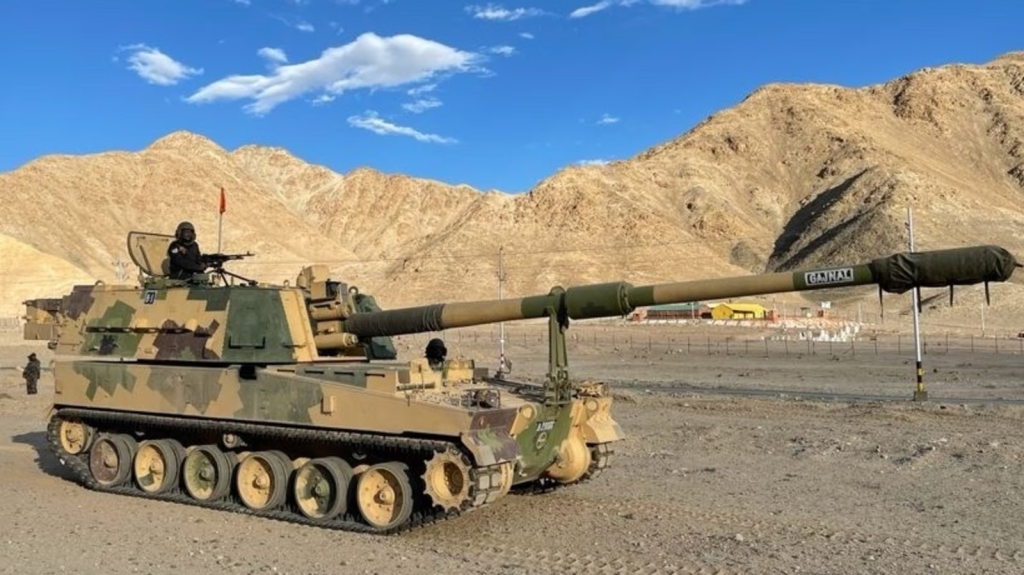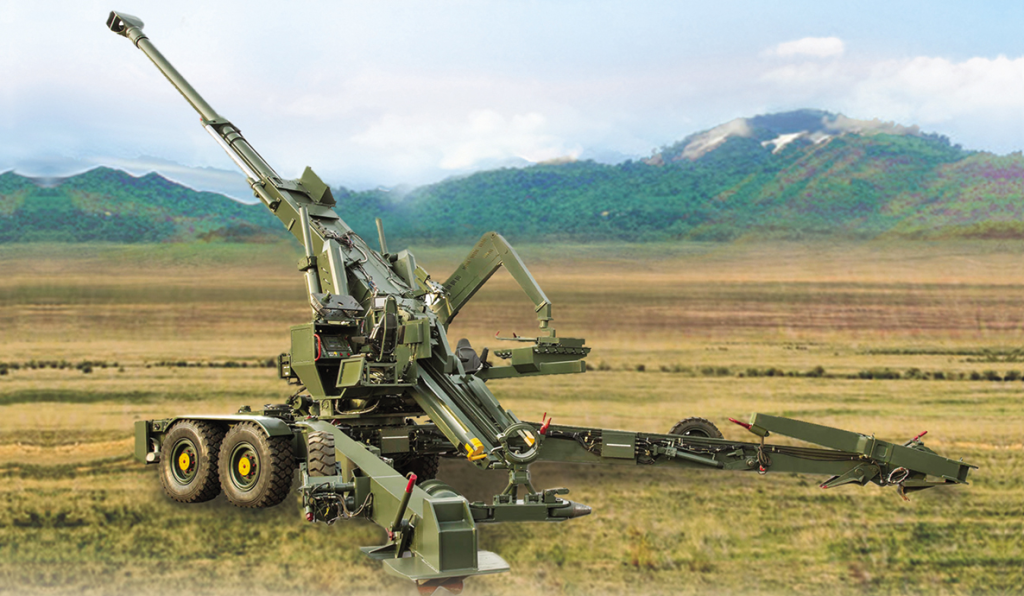The induction of Dhanush, K-9 Vajra, and ATAGS marks a significant leap in India’s artillery capabilities. These systems combine indigenous innovation, advanced technology, and operational flexibility, supporting the Indian Army’s modernization drive and the broader “Make in India” initiative. With ongoing upgrades and new procurements, India’s artillery regiments are poised to meet future challenges with enhanced firepower and self-reliance.
Artillery Guns of India
Dhanush: The Indigenous Successor to Bofors
- Dhanush is a 155mm/45-calibre towed howitzer developed by the Ordnance Factory Board (OFB) as an improved derivative of the FH-77B Bofors guns acquired from Sweden in the late 1980s.
- It features advanced electronics, including an Automatic Gun Alignment and Positioning System (AGAPS), which allows for faster and more precise targeting, especially when integrated with modern surveillance systems like the Swathi Weapon Locating Radar6.
- Dhanush can fire all types of ammunition used by the Indian Army and boasts a range of up to 42 km in its latest versions.
- The gun’s development faced initial setbacks due to ammunition-related incidents, but subsequent trials have demonstrated its reliability and effectiveness, making it a cornerstone of India’s towed artillery regiments.
K-9 Vajra: The Self-Propelled Powerhouse
- The K-9 Vajra is a 155mm/52-calibre self-propelled tracked howitzer, produced in India by Larsen & Toubro (L&T) in partnership with South Korea’s Hanwha Techwin.
- Originally intended for desert operations, the K-9 Vajra has proven its versatility by being deployed in high-altitude regions like eastern Ladakh, following the standoff with China.
- The Indian Army has already inducted 100 K-9 Vajras, with plans underway to procure an additional 100 units.
- The system features high mobility, rapid deployment, and advanced fire control, making it ideal for mechanized operations and supporting fast-moving armored formations.
ATAGS: The Advanced Towed Artillery Game-Changer
- The Advanced Towed Artillery Gun System (ATAGS) is a 155mm/52-calibre howitzer, fully designed and developed in India by the Defence Research and Development Organisation (DRDO) in collaboration with Tata Advanced Systems and Bharat Forge.
- ATAGS stands out for its all-electric drive (a global first), automation, and advanced fire control, including an inertial navigation system, muzzle velocity radar, and ballistic computer.
- It boasts a firing range exceeding 40 km, a high rate of fire (five rounds per minute), and the ability to fire multiple types of 155mm ammunition.
- With over 80% indigenous content, ATAGS is designed for deployment across varied terrains, from plains to mountains, and is fully integrated with the Army’s Shakti command and control network.
- The Indian Army has signed a deal for 307 ATAGS units, marking a major leap in self-reliance and export potential.
Comparative Overview
| Feature | Dhanush | K-9 Vajra | ATAGS |
|---|---|---|---|
| Type | Towed Howitzer | Self-Propelled Howitzer | Towed Howitzer |
| Calibre | 155mm/45-calibre | 155mm/52-calibre | 155mm/52-calibre |
| Range | Up to 42 km | ~40 km | >40 km |
| Mobility | Towed | Tracked, self-propelled | Towed (highly mobile) |
| Indigenous Content | High | 50%+ | 80%+ |
| Key Features | Advanced electronics, AGAPS | Rapid deployment, mechanized ops | All-electric drive, automation, advanced fire control |
Other Notable Artillery Systems
- M777 Ultra-Light Howitzer: Imported from BAE Systems, these lightweight guns are suited for rapid deployment in mountainous regions and have also been inducted to complement indigenous systems.
- Upgraded 130mm Guns: India has also undertaken an “up-gunning” program to convert older 130mm artillery to 155mm calibre, enhancing range and lethality at a fraction of the cost of new guns.
Conclusion
The induction of Dhanush, K-9 Vajra, and ATAGS marks a significant leap in India’s artillery capabilities. These systems combine indigenous innovation, advanced technology, and operational flexibility, supporting the Indian Army’s modernization drive and the broader “Make in India” initiative. With ongoing upgrades and new procurements, India’s artillery regiments are poised to meet future challenges with enhanced firepower and self-reliance.











